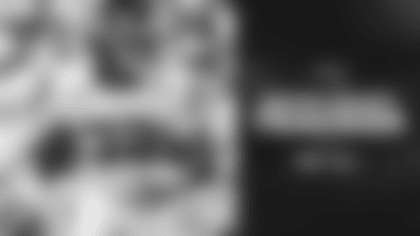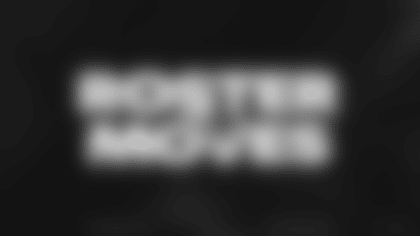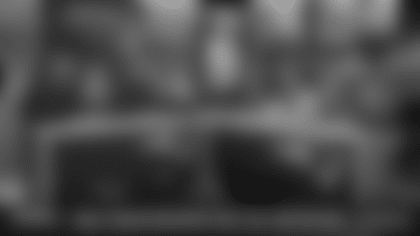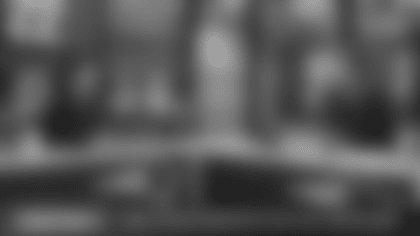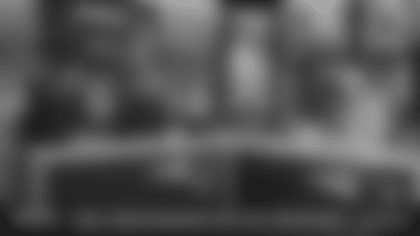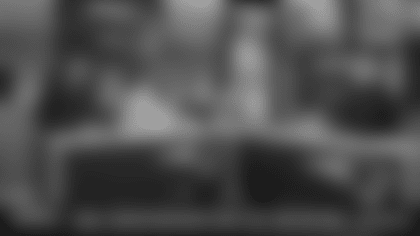BB: We made one roster move today. We signed Earthwind Moreland. He was with Cleveland recently. [He gives the team] a little bit more depth back there. We had a lot of contact this morning. It was a pretty heavy practice in terms of hitting. We worked a lot on the running game. We did some goal line. We worked on a lot of blitz pick-up and things like that as a carry over from yesterday. I think the guys are banging it around pretty good. I think that is a big part of it. We play a week from tomorrow so not only getting the legs and the soreness and all of that worked through but getting used to the contact and getting acclimated to it and playing it at the tempo is something that we try to do now while there is still a little bit of time for them to bounce back and get more into a weekly routine on that type of contact. We have really tried to pick that up a little bit here the last two practices. We will be moving into some situational things as we go here the next couple of times again, more substitution, more red area/goal line, two-minute, plays like that with officials. They have been calling things as we would expect them to call them in a game. That is giving the players more of an awareness of what is acceptable and what isn't as I know you remember from last year. We got off to a pretty slow start in the penalty situation in the first four games leading up into the bye week we had, percentage wise, a significantly higher number of calls and penalty yardage lost earlier than we did later on in the year. Special teams was probably the biggest gap there, where we had almost three-quarters of our special teams penalties in the first nine games of the season. We want to really try to put an emphasis here early in camp. Hopefully that will continue into the regular season, and we can try to do a little bit better in that area. That is about where we are. If it is nice [weather], we will be outside and if it isn't we won't. It is nice having the [indoor] facility. I thought we had a good, quality practice this morning. It wouldn't have been as good had we been outside on the wet turf and plus chewed up the field. It was good to be able to take advantage of that this morning.
Q: How is Kevin Faulk's role changing or developing, and how does he look in camp so far?
BB: I think Kevin has looked pretty good in camp. He missed the first couple of days. Kevin looks good. He has good quickness. He has good vision. I think he is handling the ball well both in the running game and passing game. We worked with him in the return game. His role, we will see how that goes. I am not sure what anybody's role is at this point. I think that he could certainly play on every down, first, second, third and fourth. To what extent that would be, some of it will be affected by what he does. Some of it will be affected by what the combinations are and what we have on the field and how it works in with everybody else. That is really out of his control. But I think he has performed well and certainly has shown that he is ready to go. He is off to a good start.
Q: Now that you have someone who would seem to be an every-down back in Corey Dillon, can you start to explore different roles for Kevin as well as a third-down back and in the slot?
BB: I think we have done that. He has been out of the backfield a decent amount. He caught the fade pattern against Atlanta a couple of years, and he has been out there on a lot of different things, screens, slants, go-patterns and so forth. He has played for us on every down, and we have confidence in him on every down. Whether it is running the ball on first down or whatever the assignments are on first down, third down passing situations, he has been good there and he has returned kicks for us, both punts and kickoffs and he has been productive at both of those. I think he can contribute on all four downs. It is just a question of how much that will be and where we want to put the emphasis relative to the overall mix of the other people who performed those different jobs because it is not just a running back thing. When you start getting into third down and fourth down, there are other players involved as well besides say him and Corey as a first-down back.
Q: In 2000 when Kevin was having trouble holding on to the football, what made you stick with him?
BB: One thing about Kevin is he is one of the most coachable players that I have ever been around. He is the type of kid that when you tell him what you want him to do, he works very hard to do it the way you want. He is very flexible. He really tries to work on what you tell him that he needs to work on, obviously the weaknesses. He is very diligent about it, and he puts a lot into it and so I have tremendous respect for that. He has improved it tremendously. He has improved his pass blocking. He has improved his route running and he has improved his ball security I think significantly, and I have a lot of respect for any player that works that hard like that. Kevin has done it, and he is much better at all of those things.
Q: What specifically would you like to see improve from the running game last year in regards to blocking? What would you like to see get better?
BB: Well, I think we would just like more production. With what plays that comes with, some of that is related to scheme and some of it we will see as we go forward. Maybe there will be some plays that we will run better than others. We will find that out as we go along. Not that we don't have any idea of what we want to do, I am not saying that, but if you work on 10, 11 core runs and then you end up running six or seven of them, then there is a reason why you picked out those six or seven. Sometimes, it is related to the blocking. Sometimes it is related to the guy who is running the ball. Sometimes, it is related to the scheme that some plays fit better against some scheme than others. I think you want to have a core group of plays that can handle most of the schemes that you are going to see so that you are not putting in a whole bunch of new ones every week and then maybe pick one or two of those others ones and add to, let's say six, just picking a number here based on the way your particular opponent plays.
Q: When you bring in a guy like Corey, do you adjust him to what you do offensively with regards to the way you run block or do you adjust to the way he runs?
BB: I think it depends on the situation. In this particular case, watching what he did in Cincinnati, he ran certain plays in Cincinnati very well and there wasn't as much of a variety. I think we have probably more of a variety in our running game. We have run and will run the plays that he has been the most productive on. I am sure that he is pretty okay with those. He is a good running back so it isn't like he doesn't know how to run them. Getting used to the blocking and getting used to some of the adjustments on it, that is what camp is for. I think it will be a combination of doing things that he has done and then he will have to pick up some new things and we will work with him and see where we think the best production is going to come from.
Q: When you study him on film, does he have certain skill where he doesn't need a big crease to get through the line? What makes him so good?
BB: Well, I think Corey breaks a lot of tackles, and he gets a lot of yardage on his own. That is what any good back does, is they create yards on their own, however they do it. Whether it is with their speed, their quickness, their power or a combination of them. He is a powerful guy. He has a good stiff arm, and he breaks tackles. When he gets in the open field he can run so you don't see him get run down a lot. But you see him run through people, and that is definitely a strength.
Q: Why do you think the penalties decreased as the season went on?
BB: I am talking about what I would consider the judgment penalties and the concentration, the false starts and stuff like that. That doesn't have anything to do with a judgment call by the officials. That is just lack of concentration by the player who doesn't go off on the snap count or who lines up in the neutral zone or creates those kind of errors. They are correctable by concentration and discipline. That was definitely better as the season went along. We had a lot of special teams penalties, blocks in the back, face mask, stuff like that, that is kind of careless and poor judgment. Those, we had fewer of them. I guess our judgment was better or decision-making was better on things like that. The biggest problem we had last year was the combination of all of the different types of personal fouls, unsportsmanlike conduct, roughing the passer, roughing the punter, unnecessary roughness and all of that stuff. We had too many of those. Some are close calls. Some weren't. But, the bottom line is when you have that many of them, you have to find a way to commit fewer and that is another area of emphasis for us.
Q: Did you have to take time away from practice to talk to the players about that?
BB: I think it is one of those things that you constantly are on whether you are getting them or not. But, I would say that we devoted more meeting time to it than practice time to it, but it was a significant commitment in terms of meeting time on what we are doing wrong, how the game is being called league-wide because we do get biweekly tapes from Mike Pereira either with a rules clarification or, 'Here is a trend in the league. Here is what we are seeing. This is what we are going to start calling. We have instructed the officials to call this. They have been kind of letting go, we are going to start tightening it up in this area,' or things like that. We try to keep up with the pace on that.
Q: What is the biggest challenge for a young safety when making a transition to the pro game?
BB: [It] probably depends on who the player is and what he comes with. They are seeing a much more sophisticated passing game than they have seen in college, regardless of where they are coming from. [The NFL has] better quarterbacks, better receivers and more combinations in the passing game, different ways to attack either individual defenders or the scheme of coverage that you're trying to run. I don't think there is any question about that. We don't deal with some of the option responsibilities and that type of thing that college secondaries have to deal with because that is a significant part of their responsibility in terms of the quarterback pitch option situation. That really has to be handled by the perimeter. That is certainly more than replaced by the formations, quality of quarterbacks and receivers, and passing scheme that the NFL coaches run to try to break down the coverages.
Q: What expectations do you have for Rohan Davey for this season?
BB: Expectations for him? The same as every other player - to be in condition, to know what to do and to play hard and do his best at all times. What that results in? I don't know what that is going to be. I think if he does that it will give himself the best chance to perform well, and we will evaluate his game performances. I think that his practices have been good, and he is well ahead of where he was last year. But, particularly for his position, that all has to translate over into the games to making good decisions and moving the team and getting the ball into the end zone.
Q: From what you have seen at this point, do you think he will perform better in certain situations?
BB: I think he's more comfortable and has more experience in our offensive system than he did a year ago, without question. From last year's practices to this year's practices I think the level of execution is significantly better. Again, it's important, but in the end what is really important is how that is in the games. That we're going to have to see.
Q: Do you think that the coaching situation will improve him?
BB: I hope that he will improve. I hope this coaching will improve him like I think it would. Charlie [Weis] and I have done pretty much in the same role with the quarterbacks for the last three years going back to the '01 season. John [Hufnagel] was here last year with the quarterbacks, and Josh [McDaniels] will work with them this year. So, that element has been added or had a little bit of variation over the last three years. I think the role that Charlie and I have will continue to pretty much stay the same. Hopefully, those players will be respectably coached.
Q: What does "Big Cat" Williams bring to the offensive line?
BB: Well, a lot of size and a lot of experience. James has been out of football for a while, and part of it for him is getting back the timing, the techniques, the recognition, the reactions and so forth. That's what I talked to him about. That's what he's been working on. I certainly think he has enough experience, but doing the things and doing them at the level to block the defenders that he has to block, that's really where he is at this stage in his career is to regain that, not only technique, but that quickness and explosiveness to do those things against good competition.
Q: How do you balance coming off of a good season, statistically speaking, and making necessary changes so other teams see something different from you?
BB: I think you just have to take all the information that is given to you, analyze it and do what is best for your team. There are certain areas that we got attacked, defensively, that we think we're going to maybe need a little bit better answer for than we really had if that attack were to be developed. There were some things defensively that weren't particularly good last year, or they were only good at different points in the year. Some things were better than others depending on what period you looked at, what window it was. So, the consistency is an issue there, to try to play that consistently at a good level, instead of a few games here, a few games there. Those are definitely two areas that really address what the question is. A lot of things might have been okay statistically, but they still need a lot of work. There were other things that I think we can kind of see, when you're watching the film closely, that maybe it wasn't a great play, but we see what they're trying to do and we're going to have some trouble here sooner or later. They have a pretty good way of putting us in a tough spot, and you give the other coaches credit for having the thought to develop that, and to try to hit that point you better have some way to at least know what you're going to do if it is a problem.
Q: Is there an example of a scenario when there was something you saw your team doing on film that other teams didn't see in order to take advantage of?
BB: No, no. Teams are after us. Sometimes, a team runs a play, they only run it twice, they have a pretty good-looking play, but they are outrun a couple of times. They're probably sitting there after the game saying, 'We should have kept going with this. They have a little problem with this action,' and that type of thing. You have other situations where they run the play that they ran, but maybe the next time they run it instead of running the tight end up the seam they kind of bend him out where there is a bigger hole and it would be an easy thing for them to do against a certain look. You would say, 'Well, what are we going to do about that now?' I don't think we're making up stuff here. We're saying, 'These are plays, and if we get more of this, and yes, it was good as long as they keep doing that. Now, as soon as they start doing something else we're not quite in as good a position here.' I think you should just better be ready to move to that point. We run a lot of different defenses. I can just tell you, we have 10 different defenses. They are not all statistically great, I can promise you. Some are better than others. The ones that aren't as good, you either fix them or get rid of them and spend more time calling the ones that are productive.
Q: When teams spread you out is it harder to disguise your defense? Do you see a lot of teams doing that to you?
BB: Let me just answer it this way. There are really two ways to look at it. Offensively, if a team doesn't move and they just leave their formation one place, it's a lot easier to read the defense because the defense is stationary and the offense is stationary. You can see where they are. Teams like St. Louis that shift twice then go in motion on virtually every play and hardly ever line up in the same formation twice, at the end of the play it was very hard to read those defenses because the defense is doing all they can just to get lined up and get their assignments called correctly. So, it's two different schools of thought. Some teams like to keep the defense constantly adjusting and moving and force the communication and just put all the pressure on them, which sometimes simplifies the whole package. [It is] Like what Dallas used to do with [Tom] Landry. They would shift once, then they would shift again and the line would hop up and down, then the guy would go in motion. So you got that on every single play. You're constantly calling a defense, then you recall it, then you recall it again, then you adjust it when a guy goes into motion. It's too hard to read it. There are too many moving parts there. Half the time the defense isn't lined up properly, even where they should be, whereas if you just come out there and stand there in one stationary place, which is the classic Ted Marchibroda philosophy. Ted almost never put a guy in motion unless it was a running play. They would get out and stand and spread the field as much as possible, line up out there and a quarterback comes and stands there, and stands there, and stands there until he can figure it out…maybe not even change the play, just they're going to rotate over here or they're going to play two-deep coverage, then that's where they go with the ball. Disguise is important when the offense is trying to read you. Disguise isn't that important when you're getting multiple moving parts. What's important is to be able to get lined up and get in a position where you can play your responsibility. Teams are running guys in and out of the huddle very play, and they use multiple formations with a lot of shifting and motion. That's not really going to be a big disguise game. You're just lucky if you can get lined up and play the defense the way you want to play it. It's a different attack.
Q: How many of those motion teams will you face this year?
BB: We see a good part of that. Kansas City is running the same thing St. Louis is. The West Coast teams, those are all multiple teams. Not to say they don't read a defense, but they don't read it like a team that is a stationary offensive team will read it.
Q: Would Miami be considered a stationary team?
BB: Well, they weren't with Norv Turner. [With] Norv Turner, they would line up in a one-back set and motion [Rob] Conrad back in the backfield and line him up in the backfield and motion him out so you never know if you're dealing with a one-back team or a two-back team or where the tight end was going to be. [Randy] McMichael usually lined up everywhere but at tight end until the end of the play, then a lot of times he would finish there. It varies from team to team.
Q: Can you talk about some of the challenges Eugene Wilson has coming into his second year?
BB: I think that all players as they come into the league, young players, have a disadvantage in that there is a big adjustment to the game. They have to learn a lot. They have to adapt to a different type of game and, to a certain degree, a different culture and a different lifestyle. On the flip side of it, teams that haven't seen those players play as much, it's hard to game plan for them just because you haven't seen the guy. As that rookie season goes on, teams do a better job of really attacking the weaknesses of the players as they have seen them play. Of course, going into the second year there's a lot more of that. Now everybody has the book on all those rookie players from, in this case, the '03 season, in whatever position they play. Whether it's the individual player that's going against them or the coach that is scheming for that team knowing what that player's skills are, then I think there's a lot more scheming that goes on with those guys. So Wilson, and everybody else, definitely falls into that category as to what things has he been hurt with in the past, or what things, based on the way he plays, would the receivers or coaches think he would be vulnerable to next time around on them. A lot of times, even as a coach, sometimes you watch that on film and you think you have it, but when you see that guy in person or play him in an actual game maybe it's a little bit different than what you really thought it was. Again, a lot of that is in the books now. I think people have a better understanding of it. I know we certainly do with the rookies we faced last year, how to deal with them. That will definitely be a challenge now. Everybody knows them. Everybody has seen them. Everybody has a way that they think they can beat them, and they will be more specifically inclined to run those types of plays rather than ones he was naturally good at. Maybe they hadn't really observed any weaknesses so they ran them, and they were actually playing to his strengths. I think those days, for all veteran players, they are fewer.
Q: Do you coach your players knowing that teams will come after them in specific ways?
BB: Definitely, on two levels. At the start of the offseason we evaluate them and say, 'Look, in the offseason, here are the things you need to work on. This stuff will improve your game,' whatever it happens to be. Then, as we get into the specific games, we definitely go back and are aware of all the plays. Sometimes coordinators switch teams or something like that, but if you got hurt with a play from Green Bay and that coordinator has gone to Baltimore and you're playing Baltimore, you could see that same play again or that same type of scheme. Knowing the plays we've been hurt with, either by scheme or to individually attack players, there are certain players that that's kind of the book on them in the league. They are going to double move certain corners. They are going to run play action on certain safeties. They are going to run misdirection on certain linebackers. Yes, going into the offseason we talk to them about that, and as we prepare for the games we try to anticipate what types of plays they will see and try to rep those plays or show it to them on film like, 'Hey, it's been a while since we've faced this situation. You should be ready for this. This is what they like to do to attack you.' The position coaches do a good job with that because they're only dealing with their three or four guys and make them aware of what the attack points are.
Q: How would you assess where Brandon Gorin is now versus last season?
BB: He is way ahead of where he was a year ago. I think he has made a lot of progress. He has gotten a lot of reps. It is a good opportunity of him and I think he has done well with those opportunities. He will get a lot of reps in preseason and we will see how that goes in live game conditions. I think he has improved his overall aggressiveness and confidence, his pass protection is better and his understanding of the offense because he has been able to run our plays more frequently with more reps, that has all improved. It will be interesting to see how that turns out when we get into preseason games and he is playing against good people which working with the first unit, he will see that. That is where he is





